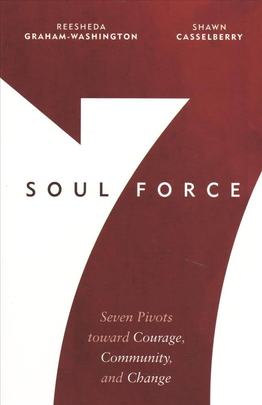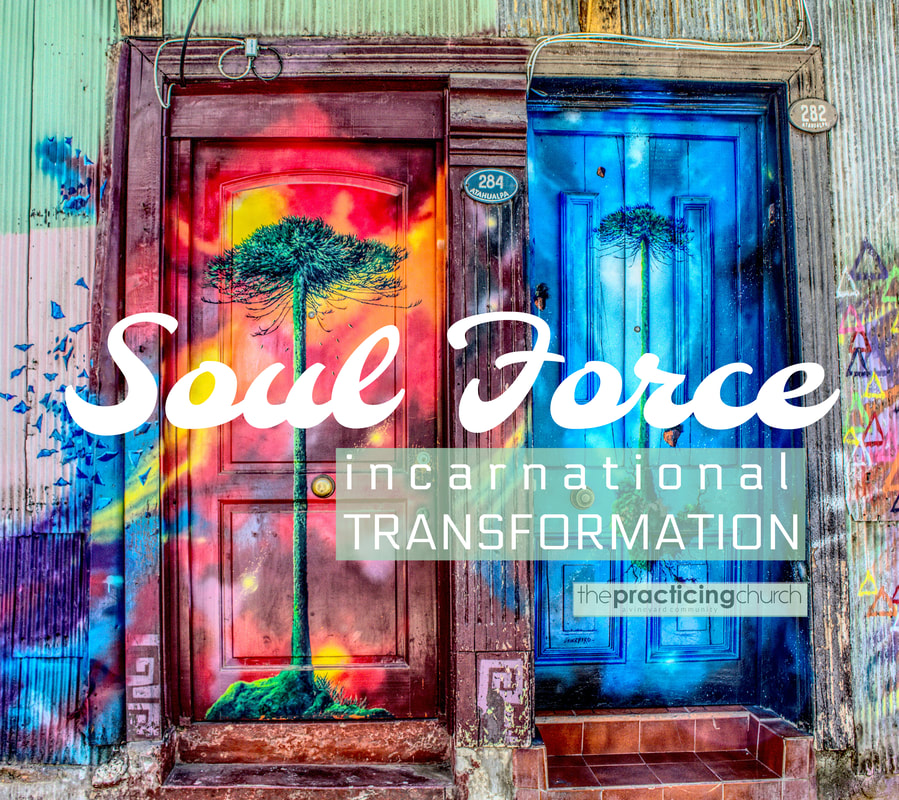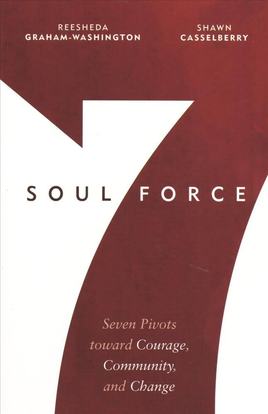We are living in the midst of polarized times, political divides and inflammatory discourse, where bridge-building is not only needed but paramount today. This week as we continued our conversation around Reesheda Graham-Washington and Shawn Casselberry's new book, Soul Force: Seven Pivots toward Courage, Community & Change, we talked about moving from building barriers to bridges.
We, as humans, have a gift for erecting walls and building barriers. Sometimes these barriers and boundaries serve us well, keeping us from danger and harm. (Healthy boundaries are good.) And yet when we build barriers from places of unhealthy fear, they can destroy relationships, prevent us from learning and growing and can create huge divides between people.
In times of crisis, the wise build bridges while the foolish build barriers.
-King T'Challa, The Black Panther Film
Jesus was always breaking through barriers and crossing boundaries to build bridges to the "other". Whether it was breaking the Sabbath rules to heal a man disabled and disenfranchised from society; crossing cultural, religious and gender divides to speak to the Samaritan woman at the well; eating with drunks and tax collectors or touching the unclean leper; we can see that the central theme of Jesus' ministry here on earth was the ministry of reconciliation. [2 Corinthians 5:18] And we too, have been given this message of reconciliation as ambassadors of Christ and followers of Jesus.
But what does it really mean to be people of faith in the midst of deep division? Can we stand with the marginalized without marginalizing those who don't agree with our stance? How can we hear our opponents rather than further isolating them? How do we address the barriers that marginalize and dehumanize others?
This week, our challenge is to practice bridge-building right here in our neighborhood. To practice the art of dialogue and listening to understand in our work places. To practice compassion, offering welcome and receiving the hospitality of those we are afraid of in our schools. To practice the gift of coming together in collaboration instead of suspicious competition in our communities .
And so as I attended the listening event for the Uighur people at our local Shoreline Bosnian Mosque this last Sunday, I saw all of these principles in play -- and it was a beautiful thing. Uighur Muslims, Bosnian Muslims, Christians and concerned researchers and activists came together. We listened to the stories of the other, of our Muslim brothers and sisters, who have been persecuted and who are now experiencing untold suffering as over a million of their people have disappeared into concentration camps. [Learn more.] We experienced hospitality as we ate together and shared different cultural dishes. And we could not help but be moved by compassion as we looked into each other's eyes.
One young woman, I'll call her Adina, with the biggest deep, brown eyes and what I learned was heartache worn across her face, told us that her mother had gone missing nine months ago. I can't imagine the horror. Adina is incredibly smart with her Masters in Informatics at the University of Washington. She works downtown Seattle, loves to eat good Asian food and home-cooked meals, and is also a Muslim woman whose people are facing genocide. Compassion brings us together. Her eyes and her story haunt me, compelling me to pray daily for her and her family. This is how we build bridges. We must listen to the stories of those who are different than us.
And we were met with such warm hospitality by the Imam and many of the Muslims at the mosque who welcomed us into their worship space and humbly took the time to share some of their practices with us. One man talked about the centering nature of prayer five times a day -- and that when he was anxious or angry, he would return from prayer refocused and renewed in what was truly important. Another woman shared with me how it reminded her throughout her day to pause, to stop, and to remember God in the busyness of life. I shared that as a pastor, I would be so delighted to have my community praying throughout the day, and how in the Christian tradition, we also have fixed hour prayer. In fact, there has been a resurgence of interest in some of the ancient practices of prayer and spiritual direction in a world that never seems to stop. And so we found common ground in our desire to ground ourselves in love and peace in the chaotic swirl of life - which built a beautiful bridge between us.
So let us not build walls but bridges.
Let us not entrench ourselves in our camps with a growing divide between us and our enemy. Let us do the difficult and yet beautiful work of Jesus, Gandhi, King and many others who are wise enough to cross the divides and live in the tension.
by Jessica Ketola

Live in tension. Commit to stay at the table and sit in the tension before the conversation begins.
Live intention. Be thoughtful about how you are existing in yourself, in your relationships, and in your community.
Ask why. Too often we ask what someone believes without asking why. Be curious. Ask questions.
Share stories. People may or may not be moved by statistics, but they are almost always moved by story.
Stay open. Be willing to learn from those you disagree with, and be open to changing your mind.
Be humble. Having character and humility in how we talk gives greater credence to what we are saying.
Find common ground. We may not be on the same side of every issue, but we can find commonalities with others.
Examine institutional systems. Listen to the voices of people who are experiencing the detrimental effects of certain systems.
Taken from Soul Force: Seven Pivots toward Courage, Community and Change by Reedsheda Graham-Washington and Shawn Casselberry. © 2018 Herald Press



 RSS Feed
RSS Feed
